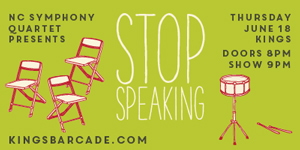Under the leadership of Donald L. Oehler, the Chapel Hill Philharmonia, which for many years was known as The Village Orchestra of Chapel Hill, continues to expand its offerings and to challenge its members and audiences. The ensemble’s latest program, given in Hill Hall on February 3, at once showed how far the group has come and how much remains to be done.
The pièce de résistance of the evening was the world premiere of a trumpet concerto by Eddie Bass, distinguished Professor Emeritus of Composition at UNCG, whose music has on several occasions been premiered in Chapel Hill. This time, the commission was engineered by soloist Paul Neebe and funded in part by the Orange County Arts Commission, an organization not particularly noted for innovative approaches to the arts or arts funding, for that matter. The clincher for the CH Philharmonic was that the OCAC stipulated the piece be premiered by a community orchestra, and Oehler and Co. jumped at the opportunity, for as the Maestro noted in his pre-concert comments, musicians can spend whole lifetimes in the trenches without ever participating in a “first performance.”
The new work, Suite Concertante, is a trumpet concerto in all but name, but it is in four movements, presented in the format of a suite as opposed to the traditional three-movement concerto. The movements — Alborada, March, Nocturne, and Caccia — are, as the composer’s brief program note states, rich in character — richer, indeed, and more varied that one might expect from a more traditional concerto. Neebe is a spectacular player whose work this writer has long admired, and if he were an organist, one would be tempted to say he pulled out all the stops, for he played three different instruments — a standard trumpet, a horn with alto characteristics, and what looked and sounded like a version of a baroque trumpet — during the course of the work. The slow third movement is intimate and reflective, as its name implies; it involves a small jazz ensemble, and for it drummer Thomas Stevens joined Neebe at the front of the stage. All the music is tonal, immediately accessible, and engaging from the outset all the way to its blazing finale, and Neebe and the CHP clearly gave it their all, delivering an impressive performance that had all the requisite qualities — good balance with the soloist and within the band, solid ensemble, considerably clarity, and lots of dynamic contrasts. It’s something of a tradition to say of a new piece that’s really good that one would welcome the chance to hear it again — and it’s often safe to say, too, since repeat performances of contemporary works are so rare, but this one merits reprogramming, and here’s hoping the CHP and other groups will take it up post-haste. (Bass contributed the note on his new work; the other notes in the informative program were by Concertmaster Mark Furth.)
Admission to the concert was free, but representatives of the Mental Health Association in North Carolina were on hand to accept donations, and remarks were offered by the head of the psych department at UNC, so the CHP’s efforts paid off in non-musical ways, too.
The concert began with a somewhat slowly paced reading of Beethoven’s “Coriolan” Overture, one of the master’s best pieces. Ensemble was a bit tentative at first, but the players soon warmed to their tasks, and the ending was solid and stately. CHP Principal Oboist Judy Konanc played the first movement of a concerto attributed to Haydn, using an edition (and cadenza) by Evelyn Rothwell, one of the UK’s finest players (and the wife of conductor John Barbirolli). The reduced string section had some probs, but overall the performance was satisfying. In a bit of programming that linked the title of Bass’ new work to one of the most famous concertantes in history, Mozart’s Sinfonia concertante in E Flat, K.364, was played by violinist Barbara Hulka and violist Katherine Stalberg. Mozart separates the sheep from the goats, in a manner of speaking, and many world-class ensembles have wound up on the rocks with his music. We’ll give the solo artists here and their orchestral colleagues high marks for effort and intent, although the performance wasn’t really ready for public consumption. Still, there’s much to be said for Oehler’s and the orchestra’s role in the fabric of our community and its musical life, so we’ll look forward to the next concert, slated for May 5, when winners of the group’s concerto competition will be featured. Details will be included in our calendar in due course.











